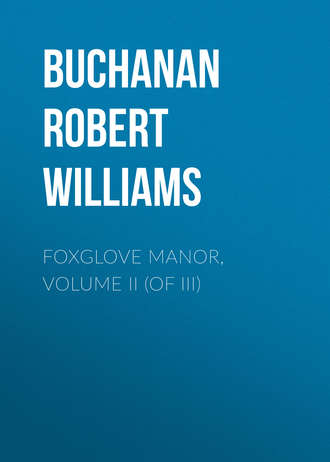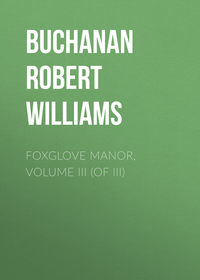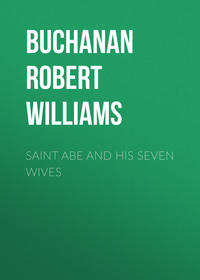 полная версия
полная версияFoxglove Manor, Volume II (of III)
How strange and dark and still it was, passing out of the sunshine into those shadows, deep and cool as the bottom of the sea! The oak trees stretched their gnarled boughs into the air, and all around them were the lesser trees of the wood-willow, elder, blackthorn, ash, and hazel. The ground beneath was carpeted with moss and grass as thick and soft as velvet, with thick clusters of fern and bluebells round the tree roots, and creepers dangling from every bough. And the wood, like the river, was all alive! Conies tumbled across the patches of light, and flitted in the shadow, like very elves of the woodland; squirrels ran up the gnarled tree trunks; harmless silver snakes glided along the moss; but here and there, swift and ominous, ran a weazel, darting its head this way and that, and fiercely scenting the air, in one eternal glitter and hurry of bloodthirsty emotion. Thrush, blackbird, finch, birds without number, sang overhead; save when the shadow of the wind-hover or the sparrow-hawk passed across the topmost branches, when there was a sudden and respectful silence, to be followed by a precipitate hurry of exultation, as the enemy passed away.
If I had been a moralist, I might have seen in this wood a microcosm of the world, with its abundant happiness, its beauty, and its dark spots of moral ugliness and cruelty. In you, Signor Weazel (who came so near that I touched you with my rod, which you snapped at ferociously, before bolting swiftly into the deep grass), I might have seen the likeness of a certain sleek creature of my own sex and species, who dwells not very far away. Nevertheless, I let you go in peace; which was no mercy to the conies, I suppose.
So I entered the Forest Primaeval – or such it seemed to me, as the blaze of sunshine faded, the boughs thickened, the air became full of dark shadows and ominous silence. My steps were now deep in grass and fern, and the scent of flowers and weeds was thick in my nostrils, but I chose a path where the boughs were thinnest, and quietly pushed through. While thus I rambled, I suppose that I fell, philosopher like, into a dream; at any rate, I seemed to lose all count of time.=
The world, the life of men, dissolved away
Into a sense of dimness, as some poet sings. I felt primaeval – archetypal so to speak, till a sudden’ shifting of the vegetable kaleidoscope recalled from thoughts of Plato and the Archetype to a cruel consciousness of self.
I was moving slowly on, when I heard the sound of voices quite close to me. I paused, listening, and only just in time, for in another moment I should have been visible to the speakers. Well shrouded in deep foliage, I looked out to discover what sylvan creatures were disporting themselves in that lonely place; and I saw – what shall I say? A nymph and a satyr? a dryad and a goatfooted Faun?
Just beyond me, there was a broad-green road through the woodland, deeply carpeted with soft grass, but marked here and there with the broad track of a wood-waggon; and on the side of this solitary road, on a rude seat fashioned of two oaken stumps and a rough plank, the nymph was sitting. She wore a light dress of some soft material, a straw hat, a country cloak, and gloves of Paris kid – a civilized nymph, as you perceive! To complete her modern appearance, she carried a closed parasol, and a roll which looked like music.
How pretty she looked, with the warm light playing upon her delicate features, and suffusing her form in its delicate drapery; with the semi-transparent branches behind her, and flowers of the woodland at her feet!
CHAPTER XXVII. THE NOTE-BOOK CONTINUED NYMPH AND SATYR
And the satyr? Ah! I knew him at a glance, despite the elegant modern boots used to disguise the cloven foot.
He wore black broadcloth and snowy linen, too, and a broad-brimmed clerical hat. His face was seraphically pale, but I saw (or fancied I saw) the twinkle of the hairy ears of the ignoble, sensual, nymph-compelling, naiad-pursuing breed.
He was talking earnestly, with gestures of eager entreaty; for the nymph was crying, and he was offering her some kind of consolation.
Presently he sat down by her side, and threw his arms around her. She disengaged herself from his embrace, and rose trembling to her feet.
“Don’t touch me!” she cried. “That is all over now. I cannot bear it!”
He rose also, and stood regarding her, not with the rapturous eyes’ of a lover, but with a dark and gloomy gaze. Then he said, in a low voice, something which I could not catch. But I heard her passionate reply.
“No, it is all over,” she cried; “and I shall never be at peace again. Even, if you kept your word, it would be the same. You do not love me; you never loved me – never!”
I crept a little closer, for I was anxious to hear his answer.
“I do love you, Edith; and after what has passed between us – ”
She shrank away with a faint, despairing cry, and put her hand to her face.
“After what has passed between us, do you think that my love can change? But you are unjust to me, to yourself; too violent and too hard to please. I do not like to be suspected, to be watched; and it is painful to me, very painful, to be constantly called to an account by you. It is not reasonable. Even as your husband, I would not bear it; it would poison the peace between us, and convert our married life into a simple hell!”
He paused; but her only answer was a sob of pain. So he sermonized on:
“Between man and woman, Edith, there should be solemn confidence and trust. When that ceases, love is sure to cease. Why, look at me! My trust in you is so absolute that no action of yours could shake it; no matter how peculiar were the circumstances, I should be certain of your faith, your goodness. That is true love – absolute, implicit faith in the beloved object. I wish I could persuade you to imitate it.”
“You know that you can trust me,” sobbed the poor child, “because I have: proved my love.”
“Have I not proved mine?” he cried, with irritation. “Have I not made sacrifice upon sacrifice for your sake? Have I not remained here, in this wretched country place, when I could have been promoted to other and greater spheres of action? Have I not made you my companion, my confidante, my nearest and dearest friend? Edith, why do you persist in such accusations? What must I do to signify our attachment? Shall I marry you at once? Speak the word, and although, as you know, it would involve the ruin of all my worldly projects, I will do as you desire.”
I had-heard enough to convince me that the affair under discussion was no affair of mine, and that I had no right to continue playing the spy; so I was drawing back as gently as possible, and about to return the way I came, when I was suddenly arrested by the next words spoken.
“Give up Mrs. Haldane!”
I The nymph was the speaker. She stood with her wild eyes fixed upon the other’s face, which did not improve in beauty of expression. For myself, I started, stung to the quick; then I returned, trembling, to my place of espionage.
“Give up Mrs. Haldane!” repeated the girl. “I ask nothing more than that. I will not force you to marry me, Charles, till it is for your good; indeed, if I did, I know that we should be unhappy, and that you would never forgive me. But you can at least cease to be so familiar with Mrs. Haldane.”
He had discovered by this time, I suppose, that the pleading mood availed him little; at all events, he suddenly changed his tone, and with a cry of angry indignation, he exclaimed —
“Edith, take care! I have told you that I will not suffer it! How dare you suspect that lady! How dare you!”
And he stood towering over her (the satyr!) in the fulness of his snowy shirtfront and the whiteness of his moral indignation.
“It is no use being angry,” she returned, with a certain stubbornness, though I could see that she was cowed, in the manner of gentle women, by his violent physical passion. “After what you have told me, after what I have seen – ”
“Edith, again, take care!”
“You are always with her,” she continued, “night-time and day-time. I am amazed that Mr. Haldane does not notice it. It is the talk of the place.”
With another exclamation, he turned his back and walked rapidly away.
“Come back!” she cried hysterically. “If you leave like that, I will drown myself in the river.”
He returned and faced her.
“You will drive me mad!” he said. “I am sick of it. I am more like a slave than a free man. You will not suffer me even to have a friend.”
“She is more than a friend. You have told me yourself, that you loved her.”
“And so I did,” he answered, “though of course she is nothing to me now.”
“Why are you always with her?”
“I am interested in her, deeply interested. She is unhappy with her husband, and as a minister of the gospel – ”
With her tearful, truthful eyes, fixed so earnestly upon him, no wonder he paused and blushed.
“Charles, do not be a hypocrite! At least be honest. She is more to you than a friend.”
He raised his hands heavenward, in pulpit fashion, and protested.
“Edith, I swear to you before God, that there is nothing whatever between us. She is a stainless lady, her husband does not understand her, I am her spiritual friend and guide.”
“Yes, Charles; I understand,” she said, still earnestly watching him. “Justus you were mine!”
I think it worth while to put that little sentence in italics. It was a home stroke, and took away the satyr’s breath.
“Edith, for shame!” he cried. “You know you do not mean what you say. If I thought you meant it, I should break with you for ever. I tell you again, Mrs. Haldane is above reproach, and it is simply disgraceful to couple her name, in such a manner, with mine. And you would infer, now, that I have influenced your own life for evil; you would mock at my spiritual pretensions, and brand me as a base, unworthy creature. Well, Edith, perhaps you are right. Perhaps I have given you cause. I have shown you that I love you, beyond position, beyond the world, beyond even my own self-respect, and this is my return.”
I could have sprung out and strangled the fellow, he was so cruel and yet so plausible, so superbly selfish and yet so completely self-deceiving; and I saw that with every word he uttered he gained a fresh hold over the heart of the pretty fool who was listening. While he spoke, she sobbed as if her little heart was ready to break; and when he ceased, she eagerly held out her arms.
“Oh, Charles, don’t say that! Don’t say that my love has been a curse to you!”
“You drive me to say it,” he answered moodily; “you make me miserable with your jealousy, your suspicion.”
“Don’t say that I make you miserable – don’t!” she sobbed.
“You used to be so different,” he continued, still preserving his tone of moral injury; “you used to be so interested in my work, my daily duties. Now, you do nothing but reproach me; and why? Because I have found an old friend, who happens to be of your own sex, but who is far above the folly of a meaningless flirtation, and who little deserves the cruel slur you cast upon her. Am I, then, to have no friends, no acquaintances? Is every step I take to be measured by the unreasoning suspicion of a jealous woman?”
By this time she had put her arms about his neck, and was sobbing on his breast.
“Oh, Charles, don’t be so hard with me! It is all because I love you – ah, so much!”
“But you should conquer these wicked feelings – ”
“I try! I try!”
“You should have more confidence, more faith. You know how much I care for you.”
“Yes; but sometimes I feel afraid. Mrs. Haldane is so much cleverer, so much more beautiful, than I am, and she was your first love. They say men never love twice.”
“That is nonsense, Edith.”
“But you do love me, dear? you do?”
Ugh, the satyr! He answered her with kisses, straining her to his heart and she, sobbing and clinging round him, was quite conquered. I felt sick to see her at his mercy. Then their voices sank, and he whispered, and I saw the bright blood mount to her cheek and brow. But, alas! she did not shrink away any more.
Then whispering and kissing, with eyes of passion fixed upon one another, they moved away, taking a lonely path into the woods beyond me. My first impulse was to follow them, and to tear them asunder. But after all, I reflected it was no affair of mine, and I knew now, moreover, that nothing in the world would save her from him – or from herself.
END OF VOL. II1
J. S. Mill.




